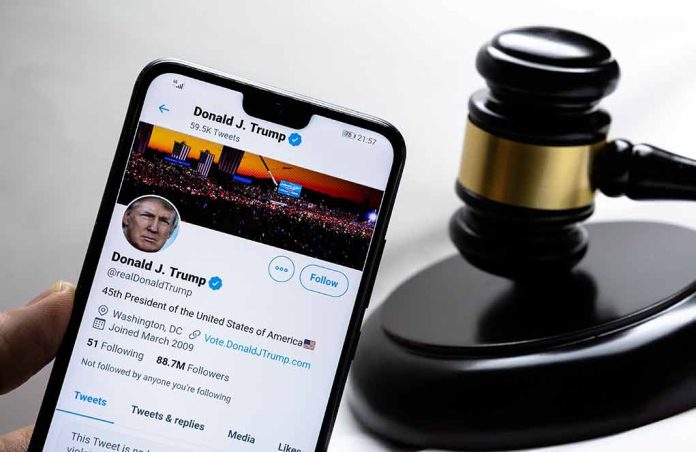
The Supreme Court has declined to hear X Corp.’s appeal challenging a gag order in Special Counsel Jack Smith’s investigation into Donald Trump’s post-2020 election activities.
At a Glance
- Supreme Court rejects X Corp.’s appeal, allowing prosecutors to access Trump’s direct messages without notifying him
- X Corp. argued the gag order violated First Amendment rights and presidential privilege
- The warrant required X Corp. to turn over Trump’s information secretly as part of Jack Smith’s investigation
- X Corp. initially resisted the warrant, resulting in a $350,000 fine for non-compliance
Supreme Court Declines X Corp.’s Appeal
The U.S. Supreme Court has made a decisive move by rejecting an appeal from X Corp. (formerly Twitter) that challenged a gag order in Special Counsel Jack Smith’s investigation into Donald Trump’s post-2020 election activities. This ruling upholds lower court decisions and maintains the government’s ability to access potentially crucial evidence without prior notification to the former president.
X Corp. had argued that the gag order violated First Amendment rights and presidential privilege. However, the federal government contended that X’s arguments were without merit and that the case was moot as the investigation had concluded. The Supreme Court’s decision not to hear the case effectively ends X Corp.’s legal challenge.
BREAKING: The US Supreme Court Just Declined Elon Musk's Appeal on turning over Trump's X messages and being forbidden to say that they did.
– The Supreme Court declined to hear X Corp.'s (formerly Twitter) appeal regarding the search warrant for Trump's messages.
– Special… pic.twitter.com/0YILc8Lnr3
— Brian Krassenstein (@krassenstein) October 7, 2024
Details of the Warrant and Investigation
The search warrant, part of Jack Smith’s investigation into efforts to overturn the 2020 election, required X Corp. to turn over Trump’s information secretly. This included direct messages and other data related to Trump’s account. The government argued that secrecy was necessary to prevent potential evidence destruction or witness intimidation.
“The Supreme Court declined to take up a challenge brought by social network X on Monday, after the Elon Musk-owned company sued the federal government for forcing it to turn over information about former President Donald Trump to prosecutors investigating him, without being able to tell the ex-president about the warrant.” – Forbes
X Corp. initially resisted complying with the warrant, which resulted in a $350,000 fine for non-compliance. The company was prohibited from informing Trump about the search warrant for 180 days, a restriction that X Corp. claimed violated its First Amendment rights.
Implications and Reactions
This decision sets a precedent for obtaining potentially privileged communications without notice in future investigations. X Corp. has warned that the ruling provides a “blueprint” for prosecutors to obtain privileged materials without notifying the subject of the investigation.
“Prosecutors now have a “blueprint” to seize privileged communications, X warned.”
The Electronic Frontier Foundation supported X Corp.’s position, arguing that the court was dismissive of the company’s arguments. However, the government maintained that its actions were justified under the Stored Communications Act, which allows for such data requests and nondisclosure orders in certain circumstances.
The case highlights ongoing tensions between investigative needs, constitutional rights, and executive privilege claims. As the criminal case against Trump concerning the 2020 election continues, U.S. District Judge Tanya Chutkan will determine which charges can proceed, adding another layer of complexity to this high-profile legal battle.
Sources:
- Supreme Court Rejects Elon Musk’s Lawsuit Against Jack Smith Over Trump Investigation
- Elon Musk’s X loses battle over federal request for Trump’s DMs
- Supreme Court boots Elon Musk’s fight with Jack Smith over Trump’s Twitter records
- New York’s highest court rejects Trump gag order appeal
- Appeals court rejects Trump’s bid to reconsider gag order in the election interference case









